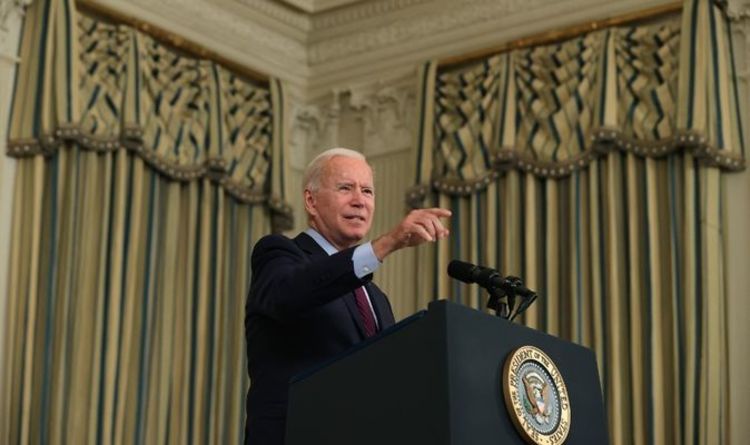

The USA pulling back from actively interceding in the affairs of other nations is down to a number of factors, which can largely be boiled down to the military and trade, according to Professor Singh of Birkbeck, University of London. Professor Singh, an expert in contemporary US politics and American foreign policy, told Express.co.uk: “I think it’s quite deep-rooted in a couple of things. One, I think, is the legacy of the failed interventions of the 2000s – Iraq and Afghanistan, notably – and so most Americans across the spectrum are very reluctant to engage in large-scale military interventions, nation-building, democracy promotion at the point of a gun, and so forth.”
This follows the US withdrawal from Afghanistan in August, as the country fell to the Taliban after years of warfare and American lives lost.
“But the second area that I think is important is trade and globalization.”
Professor Singh described how “ordinary Americans took the hit” of pro-globalisation agendas, and “outsourced jobs and investment to China”, as well as free-trade deals, like the North America Free Trade Agreement (NAFTA).
He added: “Those two elements – the military and trade – have led to a reaction and a sense amongst foreign policy elites, at least some – you saw it with Obama you saw it with Trump and we’re now seeing it with Biden – that they need to pull back their focus and adopt a more narrow definition of what America’s vital interests are.”
However, he dismissed that America was becoming isolationist, as it is “still engaged in the wider world, not least on confronting the China challenge.”
He did clarify that America’s foreign policy now is “more on its terms,” and is “prioritising a narrower definition of the US national interest than we’ve seen over a lot of previous decades.”
Comparing the Biden administration to its predecessor, Professor Singh described how it is shaped as a “foreign policy for the middle class, i.e. the middle class in America.”
This is, according to Professor Singh, “a much more diplomatic way of saying America First, but it is still fundamentally prioritising America’s interests at home, rather than being actively engaged in all areas of the world.”
READ MORE: Macron’s EU army dreams come true: Bloc plans to deploy 5000 troops
America’s foreign policy continues, as Professor Singh points out, to still concern itself with the affairs of the wider world if it does display more reticence to wade into disputes abroad.
President Biden and his administration have made clear their position on Brexit negotiations impacting Northern Ireland, imbued with a warning to Boris Johnson and Brexit Minister Lord Frost.
The Foreign Affairs Committee said in a statement: “The Northern Ireland Protocol was a significant achievement during the volatile Brexit process, and its full implementation is critical for ensuring Brexit doesn’t undermine decades of progress toward peace on the island of Ireland.”
It added: “In threatening to invoke Article 16 of the Northern Ireland Protocol, the United Kingdom threatens to not only destabilize trade relations, but also that hard-earned peace. We call on the UK to abandon this dangerous path, and to commit to implementing the Northern Ireland Protocol in full.”
Professor Singh described how the contentious issue of Article 16 could threaten the historically close relationship between the UK and the USA, in a show of how America does continue to weigh in on international conflict.
On the importance of Northern Ireland for the Biden administration, Professor Singh replied: “I think it’s huge.”
He made the distinction: “That’s not at all to suggest that Biden is anti-British – he’s not at all.
“When he was in the Senate, he was a very influential voice for the UK’s interests, for example, when the Argentinians invaded the Falklands in 1982.
“But, there are a substantial number of American politicians – Biden, Nancy Pelosi, and various other Republicans and Democrats in the House and Senate – [who] really care hugely about the Good Friday Agreement.
“Any threat to that is something that would have a severe rupture on our relations.”





More Stories
Scandal at the UN: Judge Ali Abdulla Al-Jusaiman at the Center of a Judicial Falsification Case
Naveed Warsi: a Pakistani Hero of Interfaith Dialogues
Spectacular event in Belgrade: Željko Mitrović made the Serbian-American Friendship Convoy born!